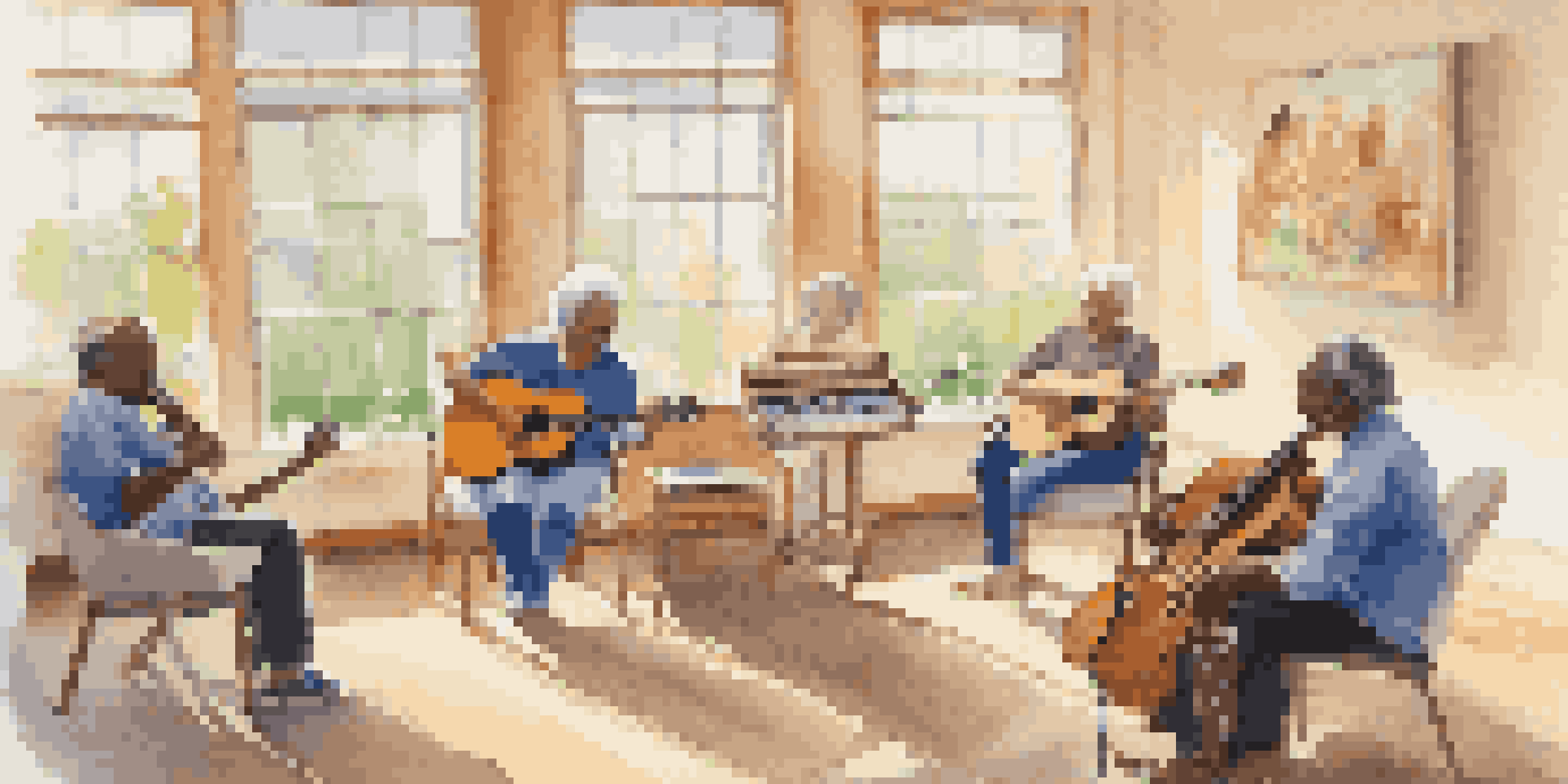How Music Therapy Affects Neurological Recovery in Stroke Patients

Understanding Stroke and Its Impact on the Brain
A stroke occurs when blood flow to a part of the brain is interrupted, causing brain cells to die. This can lead to significant neurological impairments, affecting movement, speech, and cognitive abilities. Understanding the type of stroke—ischemic or hemorrhagic—can help tailor recovery strategies, including therapies like music therapy.
Music can change the world because it can change people.
The aftermath of a stroke can vary widely from person to person, with some facing minor challenges while others may struggle with severe disabilities. This variability often makes recovery a complex journey that requires a multi-faceted approach. Recognizing the emotional and psychological toll of a stroke is crucial for effective rehabilitation.
Music therapy is one such approach that has gained traction in recent years, tapping into the brain's remarkable ability to adapt and reorganize itself, a phenomenon known as neuroplasticity. By engaging with music, patients can stimulate areas of the brain that may have been affected by the stroke.
What is Music Therapy?
Music therapy involves the use of music interventions to achieve specific therapeutic goals, such as improving cognitive function, motor skills, and emotional well-being. Licensed music therapists utilize a variety of techniques, from listening to music to actively creating it, tailored to each patient's needs. It's not merely about enjoying music; it's about harnessing its power for healing.

One of the most interesting aspects of music therapy is its accessibility. Patients do not need prior musical training or experience to benefit from it. Whether singing along to familiar tunes or playing simple instruments, the focus is on the therapeutic process rather than musical proficiency.
Stroke Affects Brain Function
A stroke interrupts blood flow to the brain, leading to potential neurological impairments in movement, speech, and cognition.
Research has shown that music can evoke strong emotional responses, making it a valuable tool in therapy. This emotional connection can help patients express feelings they may struggle to communicate verbally, fostering a deeper therapeutic relationship.
The Science Behind Music and the Brain
Music engages multiple areas of the brain, including those responsible for emotion, memory, and motor control. When stroke patients listen to or participate in music therapy, these regions can be activated, promoting recovery. This multi-dimensional engagement is vital as it often leads to improvements in both cognitive and physical functions.
The power of music is such that it can bring people together, heal wounds, and connect us to our deepest selves.
Moreover, studies have shown that listening to music can reduce anxiety and promote relaxation, which is particularly beneficial for stroke patients who may experience stress during their recovery. The soothing effects of music can create a more conducive environment for rehabilitation.
Neuroimaging studies indicate that music therapy can lead to structural and functional changes in the brain, reinforcing its role in recovery. For instance, patients who engage with music therapy may demonstrate increased connectivity in areas associated with language and movement, aiding their rehabilitation process.
Benefits of Music Therapy for Stroke Patients
Music therapy has been shown to enhance motor function in stroke patients, often leading to improved mobility and coordination. This is particularly important, as regaining movement can significantly impact a patient's overall quality of life. Additionally, through rhythmic exercises, patients can work on their timing and coordination in a fun and engaging way.
Cognitive benefits are also significant; patients may experience improvements in memory, attention, and problem-solving skills. Music's structured nature can help stimulate cognitive processes, providing a framework that aids in rehabilitation.
Music Therapy Aids Recovery
Music therapy leverages the brain's neuroplasticity to engage patients, promoting improvements in motor skills, cognitive function, and emotional well-being.
Emotional well-being is another critical aspect of recovery. Music therapy can help alleviate feelings of depression and anxiety, encouraging a sense of connection and joy. This emotional support is essential for motivating patients throughout their recovery journey.
Real-Life Success Stories
There are numerous inspiring stories of stroke patients whose lives have been transformed through music therapy. For instance, a patient who struggled to speak after a stroke found that singing familiar songs helped him regain his speech capabilities. This not only improved his communication skills but also boosted his confidence.
Another example involves a stroke survivor who had difficulty with movement. With the help of music therapy, she engaged in rhythmic exercises that not only made rehabilitation enjoyable but also led to significant progress in her physical capabilities. These stories highlight the personalized nature of music therapy and its profound impact.
These success stories emphasize the importance of tailored therapy that resonates with individual patients. By incorporating music that patients love, therapists can foster engagement and motivation, making each session a meaningful part of the recovery process.
Getting Started with Music Therapy
If you or a loved one is considering music therapy, the first step is to consult a healthcare professional. They can provide recommendations for certified music therapists who specialize in neurological rehabilitation. Finding the right therapist is crucial, as they will tailor the approach to meet specific needs and preferences.
Many hospitals and rehabilitation centers now offer music therapy programs, often as part of a broader rehabilitation strategy. These programs can range from individual sessions to group activities, fostering a sense of community among participants.
Personalized Therapy Success
Success stories highlight how tailored music therapy can significantly enhance recovery experiences for stroke patients.
It's also worth noting that family involvement can enhance the experience. Encouraging family members to participate in music therapy sessions can create supportive environments that promote recovery and strengthen bonds.
Conclusion: Embracing Music in Recovery
In conclusion, music therapy presents a unique and effective avenue for aiding neurological recovery in stroke patients. By tapping into the brain's natural affinity for music, this therapeutic approach fosters improvements in motor skills, cognitive function, and emotional well-being. The integration of music into rehabilitation not only makes the process more enjoyable but also promotes meaningful progress.
As we continue to explore the potential of music therapy in stroke recovery, it is essential to recognize its role as part of a comprehensive rehabilitation strategy. Collaboration among healthcare providers, therapists, and families can optimize recovery outcomes for stroke survivors.

Ultimately, embracing music therapy may be a game-changer for many individuals on their path to recovery, reminding us all of the powerful connection between music and healing.